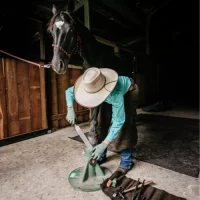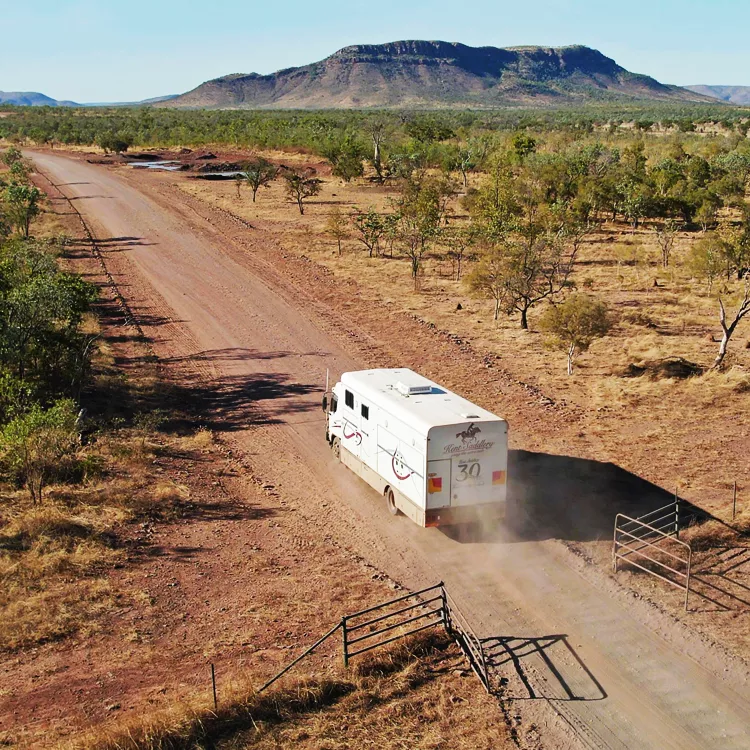Ray Ferguson, Overseer, Gallipoli Station, outstation of Alexandria Station, NT.
Ray Ferguson
“Born at the right time”
In the vast landscape of the Barkly Tableland, it’s after supper at Number 36, an outstation of Gallipoli Station. Ray Ferguson, alias “Fergie”, has cooked the evening meal which included one of his specialties, “toad in the hole” (an egg broken into a hole in the middle of a slice of bread and cooked each side on a barbecue plate until browned, crispy and delicious.) For yet another night, the workers are contemplating the prospect of sharing their swags with a population of rats which have invaded the camp….. a common occurence in the North at certain times of the year.
One night they’ll disappear as quickly as they came. (the rats that is!) It’s been a successful day….. the stock camp has put one thousand heifas through the yards and Fergie is proud to say “not one had to be chased.” He goes on, “I’m one hundred percent into low stress stock handling; always have been, although they didn’t call it that back then.” Fergie is happy working for Ross Peatling, the Manager of Alexandria. “I like the way he works cattle….. they’re always good to handle.” As an afterthought, he adds, “I’ve had good bosses all my life.”
Ray Ferguson was born in Quilpie, West QLD and at five days old, he returned to Naryilco Station, far South West QLD, where his Dad was the Manager.
“A lot of my life from there on was all Naryilco,” Fergie explains and during his early years, Fergie’s formal education was mainly through correspondence schooling from Eromanga QLD, (the Australian town situated at the furtherst distance from the ocean.) Tibooburra and Broken Hill, NSW. In 1965, after year 5, he left school. “I went straight to Naryilco stockcamp and started chasing cows.” Apart from one year (1968) at Mt Leonard Station five hundred kilometres north of Naryilco, Fergie worked for S Kidman and Co soaking up the distinctive culture associated with a Channel Country lifestyle. e young age” of sixteen, he was placed in the role of head stockman in a stock camp of about ten workers, “all older, experienced men who could’ve done it all without me and who could’ve made my life miserable….. but they didn’t.” Fergie was grateful, “I wanted to learn, and whenever I went out working with any of these men, they’d teach me something every day. Those nine years as head stockman made me what I am.”
Fergie refers to the characteristics of stock camp life that was typical of that time. “Every camp had a cook, horse tailer and the stockmen.” This was his familiar workplace for fifteen to twenty years and he’s adamant, “I wouldn’t want to trade it for anything. It was all “camp out,” all horses….. pack horses and bronco branding, out on the flat.”
In those formative years Fergie also had the privilege of sitting and watching Naryilco’s saddler, Arty Rolands, who’d “been a manager at Innamincka Station for years and years.” He’d come to Naryilco from Omrecon Station. “I don’t know how old he was,” Ray smiles, “probably over a hundred. He was a smart old man.” Fergie learned a lot about leather work from Arty as well as from his own Dad, and from then til now, has maintained an interest in making leather products; mainly “big mobs of saddle bags, radio pouches and plaited knife belts.” At that stage the young stockman also learned the traditional skill of making green hide, and plaited a few green hide hobbles and ropes.
Like all bush people reliant on the weather, Fergie clearly remembers the droughts that brought hardship and heartbreak. In particular, Fergie recalls the 1965, 1969, 1970 drought events. Back then, “don’t want to go through that again” was a sentiment shared by everyone belonging to the channel country community.
Ray’s Dad retired from Naryilco in 1979, and Fergie also left the station for a while, returning with his family to commence the role of manager at Naryilco’s outstation, Tennapperra, for Naryilco’s Manager Ted Brown.
At Tennapperra, and in what Fergie describes as “a tough time” his precious three year old daughter, Elisha drowned near the homestead in January 1984. He shares that “It changed my whole life, turned it upside down, and it’s been spinning around ever since. You never get over it”, Fergie explains, “you just live with it.”
In the aftermath of this sad time, Fergie shifted to Broken Hill, back to Naryilco for a time, before working with Graham Morton at Innamincka Station, South Australia. Then, after thirty-seven years of employment with Kidman Co, Fergie made the decision to shift to new country and a new company. He began work as the grader driver at Soudan Station, another outstation of Alexandria and situated on the Barkly Highway. After a month, he filled in as a caretaker at Gallipoli, and when the Overseer’s position became available Fergie was given the job. It was a relatively speedy progression from Grader Driver to Overseer and Fergie comments, “I’m still here and enjoying it.” He acknowledges the differences between Barkly country and that of the Channels and commends both. “They’re both good country; both grow good cattle.”
At Gallipoli, Fergie is appreciative that his son Randell and family live nearby in Mt Isa. Fergie’s three grandchildren, Elisha, Charlize, Wyatt aged 9, 7 and 5 love coming out to Gallipoli to spend time with their Grandad and Fergie
looks forward to the weekends and holidays when they all come to stay. Fergie’s pride in his gradchildren is unmistakable. “They have some real big days with me….. up at 4 am, and they’ve never whinged once. They DO have one condition….. we take plenty of food.” His daughter Jessica has also worked in the industry as a governess and Station cook.
Another source of pride for the Gallipoli Overseer is his knife collection. When Lyle and Helen visit Gallipoli, it’s an occasion for him to purchase yet another knife. Fergie cherishes his Dad’s collection of “good old knives” and is always keen to acquire “anything, so long as it’s a good knife….. I don’t go much on Woolworths specials.”
At Gallipoli, Fergie works hard to combine the old with the new. Weaning, steel yards and drafting represented big changes in their time, followed by the advent of motor bikes. Fergie was twenty five years old when motor bikes were introduced and he still has strong feelings about their presence in the stock camp. He mutters….. “still hate em.”
The camp fire has reduced to embers and Fergie prepares to leave. He’ll drive the eighty kilometres back to the Gallipoli homestead for the night. Primarily he wants to make sure the bore runner is home, and then he’ll update necessary data on his computer. Computers are another encroaching fact of life, and yet in a matter of fact statement, he summarises the situation, “You’ve gotta learn, or give it away.”
Given the number of years he lived in the Channel Country surrounded by the sandhills, scrub and river channels of far Sth West QLD, its no wonder that Fergie has retained a strong Channel Country persona. Stance, voice inflection, dress code and character all combine as he and his faithful canine companion Tojo, load themselves into the ute. He’s cheerfully planning to be back at No 36 before daylight next morning. “Four hours sleep, that’s all I need,” he reassures us.
Slap bang in the middle of 2012, this “traditional” Channel Country man has made a successful transition from pack horses to helicopters. He believes he “was born at the right time to see all the changes” and one of the biggest changes has been the shift from the Channels to the Barkly. Fergie is convinced it’s been a good one, and his final comment is accompanied by a resolute smile, “I’ve never looked back.”















